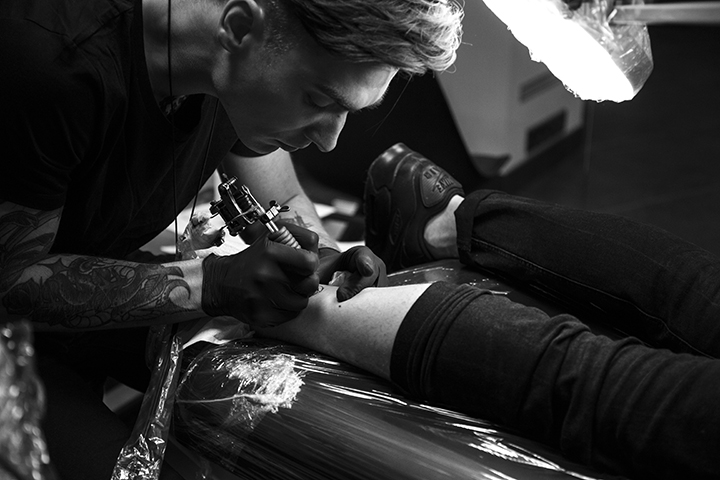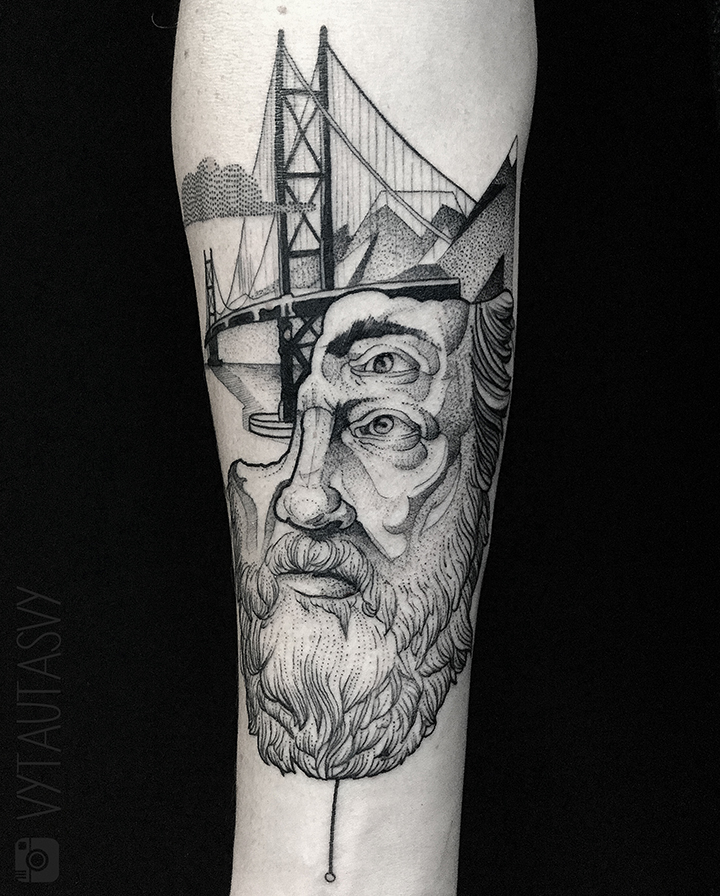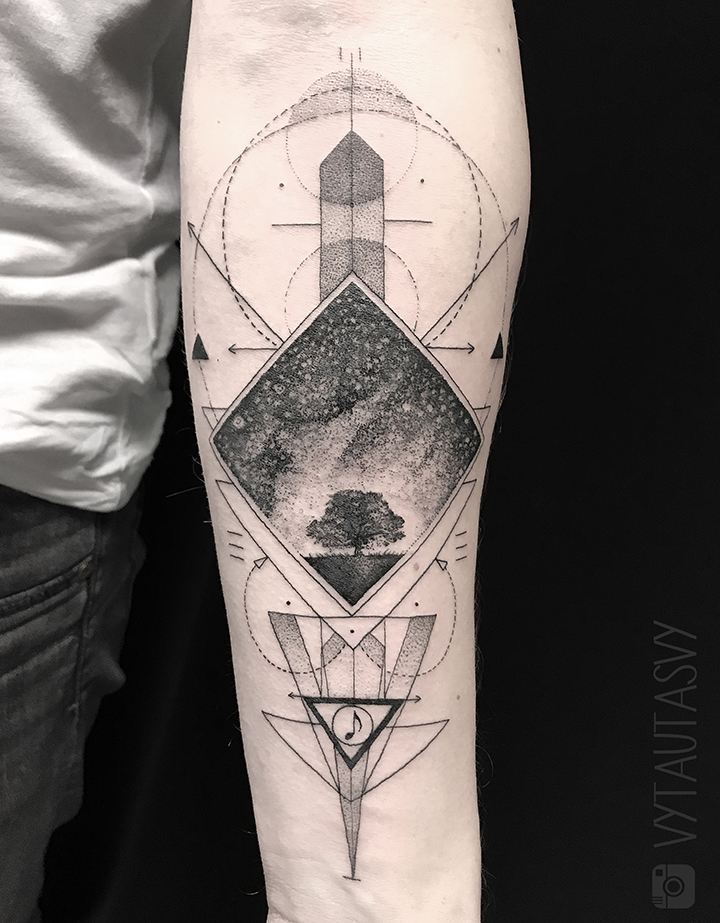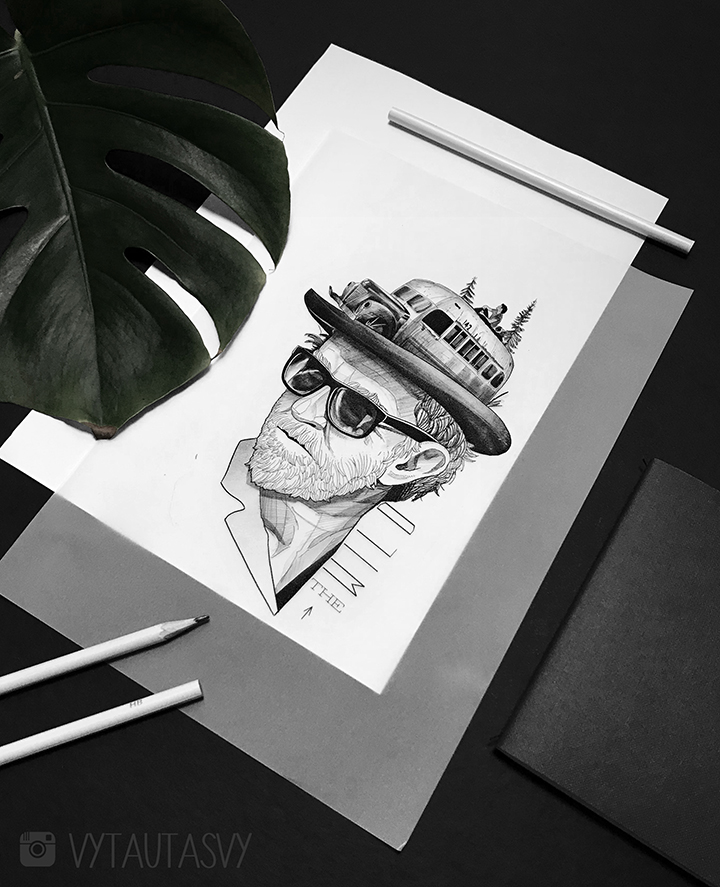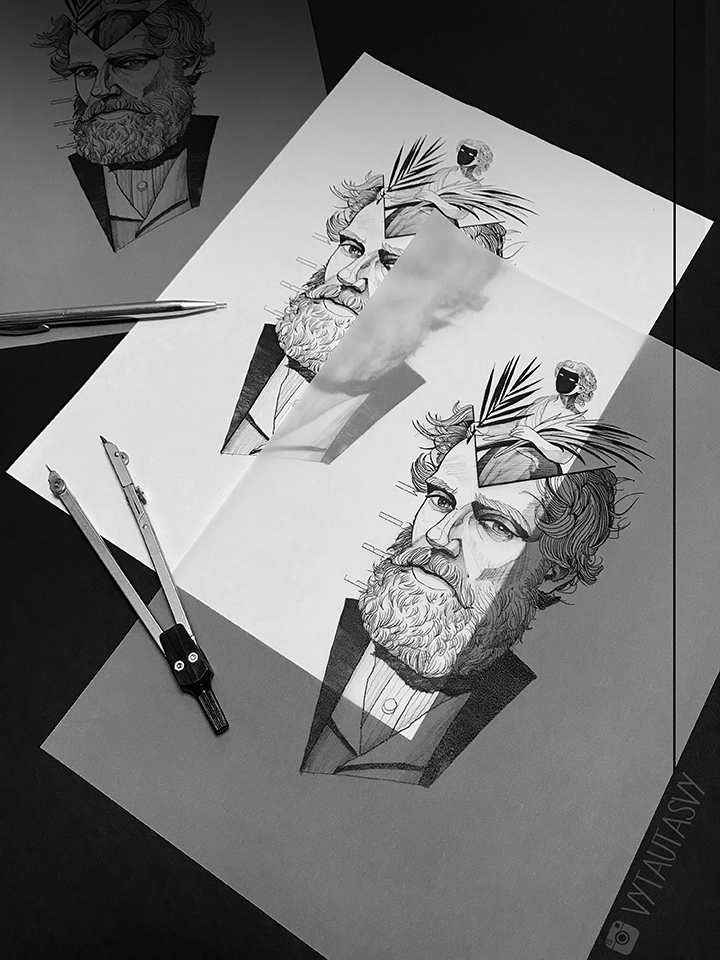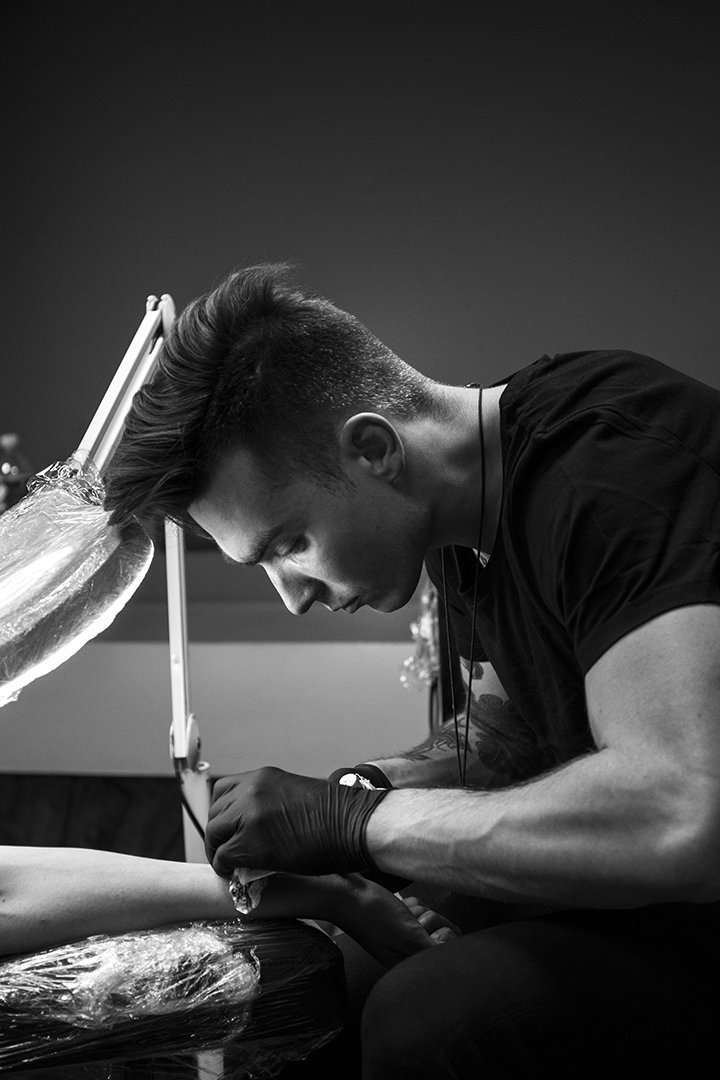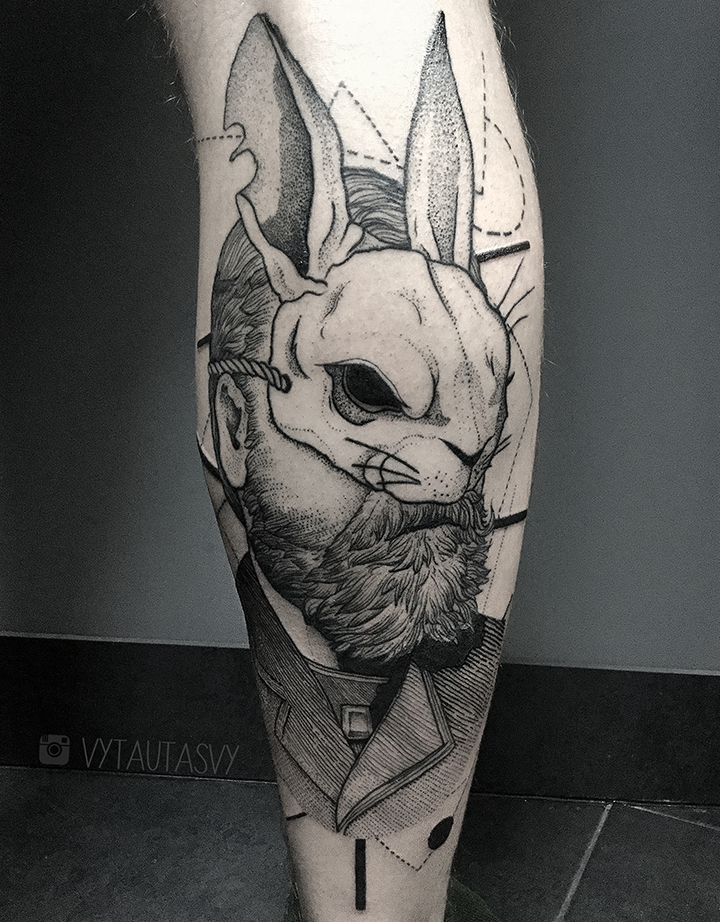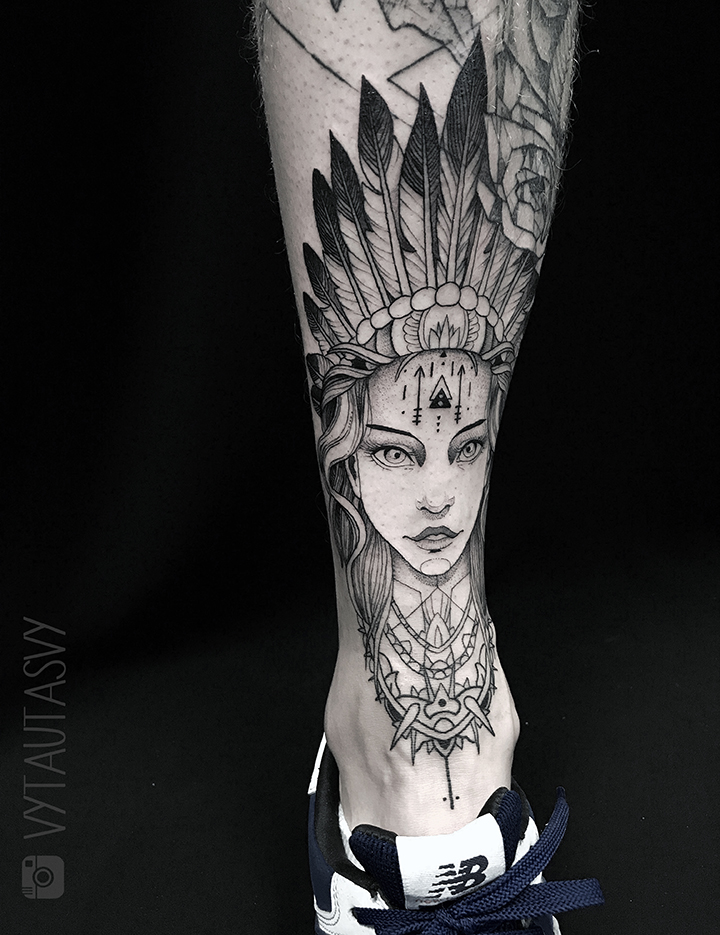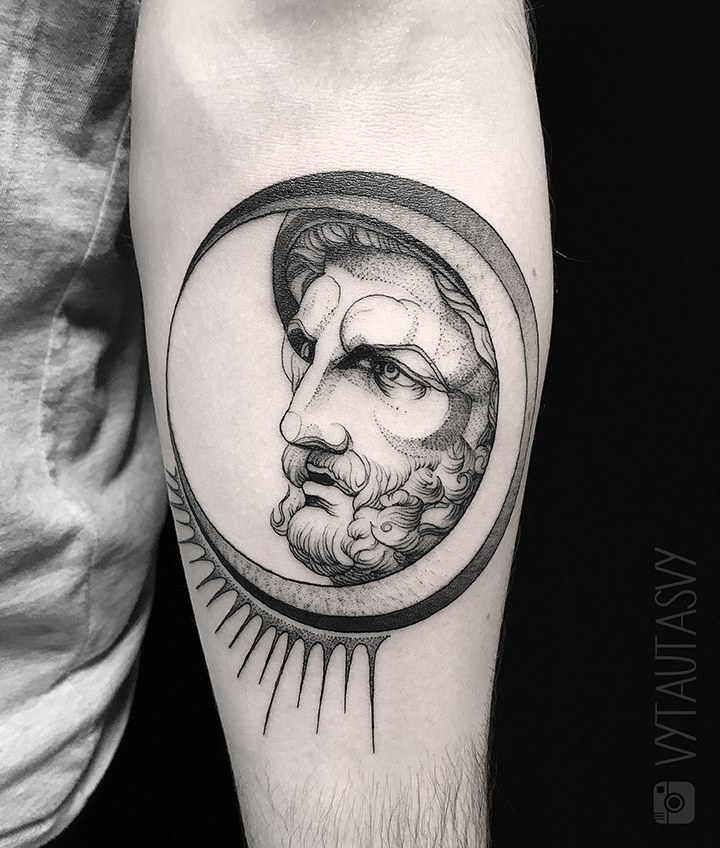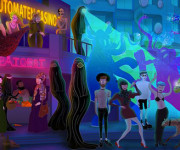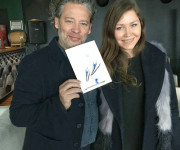Humans have been marking their bodies for ages. These permanent signs used to serve as amulets, symbols of status or religion beliefs, a form of punishment, and declaration of loyalty… Even though not so long ago many people were associating it with sailors, bikers or prisoners, in recent years, the perception of permanent ink marks on people’s bodies changed a lot. About the turnovers in our society ‘SwO magazine’ is talking with young and emerging tattoo artist Vytautas Vy.
Vytautas, please tell us a little bit about yourself and how did you decide to become a tattoo artist?
I have been drawing since I can remember. I started my artist journey 12 years ago by doing street art and all that developed into tattooing years later.
To be honest, I never really cared about it until one day I came across tattoo website and saw the stuff that could be done. I was so amazed and inspired by the work of Robert Borbas, better known as Grindesign. That was a real wake-up call…
When you look back to your past activities, how could you relate street art to tattooing?
Street art and tattooing are both very challenging and rewarding. I think both have the power of changing the perception of how people see and identify certain places once they get spray-painted and people once they get tattooed. These are the tools to transform places and people.
However, I believe that tattoos represent the more accurate image of the person having them than street art can represent public places. It’s because a person has a choice of what tattoo to get and it can be more private, opposite to graffiti, which is very open and only represent street artist’s ideas and understanding of the public space. It is also can be forced or felt unwelcome in a somehow similar way like advertising for others.
Talking about that wake-up call that encouraged you to start working with ink, weren’t you scared of needles and the pain after all?
I was super scared of needles and being this “executioner” who causes pain. However, I was more afraid to miss out on the opportunity to do what I believe is beautiful.
But there are some people that devote themselves to extremely painful sessions that are also known as brutal tattooing. What are your thoughts about pain being prioritized over aesthetics?
I am not a fan of brutal tattooing. The movement was created as a protest against mainstream tattoo industry and as an opposition to beautiful and perfect tattoos. It is done with no intention to create art nor it does require any skill to produce it, thus it can’t be called art. I think is just a complete opposite of my beliefs and I can’t see doing it myself.
Let’s talk about the beginning of your career and learning this craft. What’s more, how did it feel to hold a tattoo machine for a very first time? My first tattoo machine used electromagnetic coils to move the needle up and down. As a result, it was vibrating like nothing I have ever experience in my life. It felt like I was trying to draw with a wild horse that would try to escape from my hands.
In the beginning, I started learning by studying other professionals. After some time, I gradually started practicing tattooing on the special fake skin. Then it came time to start tattooing real people. I did some of my first tattoos on myself.
Tattooing yourself, how was it? It was very difficult. My hands did not listen to me at all as I was still learning at the time. I found it very difficult to control the tattoo machine and endure the pain at the same time. The tattoo came out all shaky. I did some corrections to the tattoo when it healed. And once again after it healed. Now it does not look too bad…
It seems that your tattoo machine is not shaking anymore since many people are already carrying your designs on their bodies. How could you describe your current style?
The style I currently work in is called blackwork. My drawings are line based and have a lot of texture and grain in shading. I believe that it helps me to create a certain feeling for my tattoos. The journey towards it was very long, I kept changing my style from doing very colourful realistic portraits to working only in black colour line based drawings. I believe it is still going to change a lot, as I have a lot of new ideas that would like to explore in the future.
Do you find your work attracts a specific type of clientele?
Probably not. Most of my clients are in the age range between 22 and 35. I would like to believe that my artwork has an aesthetic appeal and can be tattooed on anybody who finds it beautiful.
How often do you meet people who regret having certain tattoos? Only on the very rare occasions. It is always either poorly done tattoos or very old ones that are missing artistic charm that people regret having.
Have you ever experienced the moment of remorse because of making a specific tattoo to someone else, maybe you wear some that you regret yourself?
I have always refused to tattoo something that I did not approve. I have one tattoo that I do not like, but I do not regret of getting it either. It reminds me the particular time of my life when I got it.
Do you think there are challenges in being a tattoo artist that artists who create only for themselves usually don’t face?
I get the trust from other people to leave a permanent mark on their skin that there is no way to erase if it doesn’t meet their expectations. Because of this, there is always a certain type of pressure to do my job perfectly.
So, you are in a constant fear of ruining someone else’s body, right?
I am afraid to the certain level, but not in a sense that it would influence my work. I am a perfectionist. I find that anything less than perfection is a failure. It gives me the edge to always do my best and try to improve.
Besides having strong tattooing skills, what other qualities a good tattoo artist should possess?
Artistic talents, curiosity, excellent attention to detail, work ethic and a good personality.
What is the most rewarding in your profession?
It is, probably, the satisfaction of producing a tattoo that I know will stand the rest of time – that I’ve put my heart, soul, and original creativity into. I want to make tattoos that my customers are absolutely in love with.
What is the most unpleasant in leaving permanent marks on other people’s bodies?
I am yet to discover.
Tattooing used to be considered as a sub-cultural activity, now it seems to have become much more mainstream. What are your thoughts about that?
Yes, I do believe that tattoos have become a mainstream part of society. A TV show about the tattoo shop called “Miami Ink” which was firstly broadcasted in USA 2005 had a lot to do with that. It was such a success that nine years later, it already had six seasons and been aired in over 160 countries. Before this show, only the minority of people with tattoos knew what the inside of a tattoo studio was like. The show opened the channels for the average Joe to look into this “underworld” of tattoos, to realize that the art is impressive, beautiful and attainable.
Today social media helps a lot artist to share and impress all with his unique and ground-breaking designs through different channels. The internet naturally allows the tattoo industry to continue evolving in ground-breaking ways in order to deliver the best possible content and services for the millions of tattoo-culture followers out there. I believe the gap between the tattoo fan and the artist will get smaller and smaller in the future to come.
Have you noticed any particular tattoo trends lately?
Colourful watercolour tattoos have been trending lately, but trends keep changing. I would personally suggest sticking to classics which are always in and you will never feel sorry to get tattooed something that went out of style.
How much, in your opinion, tattoos are private and how much are they a public thing – to show for other people?
I think it can be either very private or public thing. It all depends on the placement of the tattoo.
Do you think that after being inked people start appreciating their bodies way more? Do you believe that tattoos might boost one’s self – esteem?
Tattooing is a way of self-expression for most people, so tattoos do bear some sentimental value. For me, this makes my body art more special – as I know I’m the only one in the world sporting the specific design. That’s a reason enough not to regret them – because I feel they make me different, they make me stand out and mostly, they make me, me.
Currently, you are located in Lithuania where tattoos used to be a tabu for quite a long time. Have you ever got insulted because of your profession? Has people’s perception altered in recent years?
In recent years, tattoos have become more popular, and are no longer just a stereotypical trait among prisoners and members of motorcycle gangs. Nowadays, tattoos can serve many forms of expression and more and more professionals of various fields become our new clients. Personally, I have never been insulted nor for my profession nor for my tattoos. Unfortunately, some of my colleges who are heavily covered from head to toes with tattoos sometimes still receive exorcism sessions in public by senior citizens.
Do you think that there is still a stigma attached to tattoos and tattooing?
Yes, I believe there is still stigma attached to tattoos, regardless that more and more people of all ages getting tattoos. Due to the commonality of visible tattoos nowadays, there are less shocked looks when people see sleeves on others. As a result, some of the harshness for visible tattoos in the workplace has diminished a little bit too.
But, there is still a looming distaste towards tattoos that I haven’t been able to figure out… One argument against tattoos is that they are unprofessional. My question back is “how can an expression of ourselves be unprofessional”?

